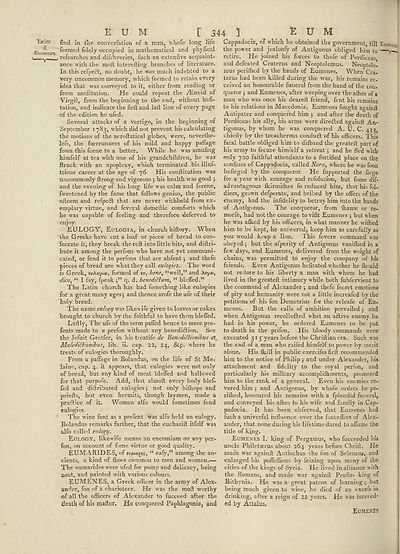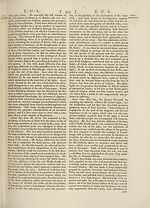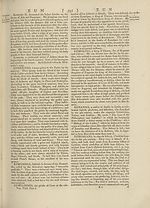Encyclopaedia Britannica, or, a Dictionary of arts, sciences, and miscellaneous literature : enlarged and improved. Illustrated with nearly six hundred engravings > Volume 8, ELE-FOR
(372) Page 344 - EUM
Download files
Complete book:
Individual page:
Thumbnail gallery: Grid view | List view

SUM [ 344 ] E IT M
itler Jn t]ie converfation of a man, whofe long life
Eunlenes ^eeme<^ ^lely occupied in mathematical and phyfical
J- refearches and difctiveries, fuch an extenfive acquaint¬
ance with the moll intereiling branches of literature.
In this refpeft, no doubt, he was much indebted to a
very uncommon memory, which feemed to retain every
idea that was conveyed to it, either from reading or
from meditation. He could repeat the i^Eneid of
Virgil, from the beginning to the end, without heli-
tation, and indicate the firit and latt line of every page
of the edition he ufed.
Several attacks of a vertigo, in the beginning of
September 1783, which did not prevent his calculating
the motions of the aeroflatical globes, were, neverthe-
lefs, the forerunners of his mild and happy palfage
from this fcene to a better. While he was amufing
himfelf at tea with one of his grandchildren, he was
ftruck with an apoplexy, which terminated his illuf-
trious career at the age of 76 His eonftitution was
uncommonly ftrong and vigorous *, his health was good j
and the evening of his long life was calm and ferene,
fweetened by the fame that follows genius, the public
efteem and refpedl that are never withheld from ex¬
emplary virtue, and feveral domeftic comforts which
he was capable of feeling and therefore deferved to
enjoy.
EULOGY, EuloGia, in church hiftory. When
the Greeks have cut a loaf or piece of bread to con-
fecrate it, they break the reft into little bits, and diftri-
bute it among the perfons w'ho have not yet communi¬
cated, or fend it to perfons that are abfent; and thefe
pieces of bread are what they call eulogies. The word
is Greek, ivXeytx, formed of ev, bene, “well,” and Xiyu,
dico, “ I fay, fpeak j” q. d. beneditlum, “ bleffed.”
The Latin church has had fomething like eulogies
for a great many agesj and thence arofe the ufe of their
holy bread.
The name enlo^xj vras likewife given to loaves or cakes
brought to church by the faithful to have them bleffed.
Laftly, The ufe of the term paffed hence to mere pre-
fents made to a perfon w ithout any benediction. See
the Jefuit Gretfer, in his treatife de BenediBionibus et~
MnlediBionibus, lib. ii. cap. 22, 24, &p. where he
treats of eulogies thoroughly.
From a paffage in Bolandus, on the life of St Me-
laine, cap. 4. it appears, that eulogies were not only
of bread, but any kind of meat bleffed and hallowed
for that purpofe. Add, that almoft every body blef¬
fed and diftributed eulogies; not only bilhops and
priefts, but even hermits, though laymen, made a
praCtice of it. Women alfo would fometimes fend
eulogies.
The wine fent as a prefent was alfo held an eulogy.
Bolandus remarks farther, that the eucharift itfelf w as
alfo called eulogy.
Eulogy, likewife means an encomium on any per¬
fon, on account of fome virtue or good quality.
EUM ABIDES, of tvfix^Yi5, “ eafy,” among the an¬
cients, a kind of {hoes common to men and women.—
The eumarides were ufed for pomp and delicacy, being
neat, and painted with various colours.
EUMENES, a Greek officer in the army of Alex¬
ander, fon of a charioteer. He w as the moft worthy
<of all the officers of Alexander to fucceed after the
death of his mafter, He conquered Paphlagonia. and
Cappadocia, of which he obtained the government, till Eumenes
the power and jealoufy of Antigonus obliged him to
retire. He joined his forces to thofe of Perdiccas
and defeated Craterus and Neoptolemus. Neoptole-
mus perifhed by the hands of Eumenes. When Cra¬
terus had been killed during the war, his remains re¬
ceived an honourable funeral from the hand of the con.
queror *, and Eumenes, after w eeping over the afhes of a
man who was once his deareft friend, fent his remains
to his relations in Macedonia. Eumenes fought againft
Antipater and conquered him 3 and after the death of
Perdiccas his ally, his arms were direfted againft An¬
tigonus, by whom he was conquered A. U. C. 433,
chiefly by the treacherous conduft of his officers. This
fatal battle obliged him to difband the greateft part of
his army to fecure himfelf a retreat 3 and he fled w ith
only 700 faithful attendants to a fortified place on the
confines of Cappadocia, called Nora, where he was foon
befieged by the conqueror, He fupported the fiege
for a year with courage and refolution, but fome dif*
advantageous {kirmiffves fo reduced him, that his fol-
diers, grow n defperate, and bribed by the offers of the
enemy, had the infidelity to betray him into the hands
of Antigohus. The conqueror, from fhame or re-
morfe, had not the courage to vifit Eumenes 3 but when
he was alked by his officers, in what manner he wiftied
him to be kept, he anfwered, keep him as carefully as
you would keep a lion. This fevere command was
obeyed 3 but the afperity of Antigonus vanifhed in a
few days, and Eumenes, delivered from the weight of
chains, was permitted to enjoy the company of his
friends. Even Antigonus hefitated whether he ftiould
not reitore to his liberty a man with whom he had
lived in the greateft intimacy while both fubfervient to
the command of Alexander 3 and thefe fecret emotions
of pity and humanity were not a little increafed by the
petitions of his fon Demetrius for the releafe of Eu¬
menes. But the calls of ambition prevailed ; and
when Antigonus recollefled what an aftive enemy he
had in his power, he ordered Eumenes to be put
to death in the prifon. His bloody commands were
executed 315 years before the Chriftian era. Such was
the end of a man who raifed himfelf to power by merit
alone. His {kill in public exercifes firft recommended
him to the notice of Philip 3 and under Alexander, hU
attachment and fidelity to the royal perfon, and
particularly his military accomplifhments, promoted
him to the rank of a general. Even his enemies re¬
vered him 3 and Antigonus, by whofe orders he pe-
riftied, honoured his remains with a fplendid funeral,
and conveyed his afhes to his wife and family in Cap¬
padocia. It has been obferved, that Eumenes had
fuch a univerfal influence over the fucceffors of Alex¬
ander, that none during his lifetime dared to affume the
title of king.
Eumenes I. king of Pergamus, who fucceeded his
uncle Philetrerus about 264 years before Chrift. He
made war againft Antiochus the fon of Seleucus, and
enlarged his poffeflions by feizing upon many of the
cities of the kings of Syria. He lived in alliance w ith
the Romans, and made war againft Prufias king of
Bithynia. He was a great patron of learning 3 but
being much given to wine, he died of an excels in
drinking, after a reign of 22 years. He was lucceed-
ed by Attalus.
Eumenes
itler Jn t]ie converfation of a man, whofe long life
Eunlenes ^eeme<^ ^lely occupied in mathematical and phyfical
J- refearches and difctiveries, fuch an extenfive acquaint¬
ance with the moll intereiling branches of literature.
In this refpeft, no doubt, he was much indebted to a
very uncommon memory, which feemed to retain every
idea that was conveyed to it, either from reading or
from meditation. He could repeat the i^Eneid of
Virgil, from the beginning to the end, without heli-
tation, and indicate the firit and latt line of every page
of the edition he ufed.
Several attacks of a vertigo, in the beginning of
September 1783, which did not prevent his calculating
the motions of the aeroflatical globes, were, neverthe-
lefs, the forerunners of his mild and happy palfage
from this fcene to a better. While he was amufing
himfelf at tea with one of his grandchildren, he was
ftruck with an apoplexy, which terminated his illuf-
trious career at the age of 76 His eonftitution was
uncommonly ftrong and vigorous *, his health was good j
and the evening of his long life was calm and ferene,
fweetened by the fame that follows genius, the public
efteem and refpedl that are never withheld from ex¬
emplary virtue, and feveral domeftic comforts which
he was capable of feeling and therefore deferved to
enjoy.
EULOGY, EuloGia, in church hiftory. When
the Greeks have cut a loaf or piece of bread to con-
fecrate it, they break the reft into little bits, and diftri-
bute it among the perfons w'ho have not yet communi¬
cated, or fend it to perfons that are abfent; and thefe
pieces of bread are what they call eulogies. The word
is Greek, ivXeytx, formed of ev, bene, “well,” and Xiyu,
dico, “ I fay, fpeak j” q. d. beneditlum, “ bleffed.”
The Latin church has had fomething like eulogies
for a great many agesj and thence arofe the ufe of their
holy bread.
The name enlo^xj vras likewife given to loaves or cakes
brought to church by the faithful to have them bleffed.
Laftly, The ufe of the term paffed hence to mere pre-
fents made to a perfon w ithout any benediction. See
the Jefuit Gretfer, in his treatife de BenediBionibus et~
MnlediBionibus, lib. ii. cap. 22, 24, &p. where he
treats of eulogies thoroughly.
From a paffage in Bolandus, on the life of St Me-
laine, cap. 4. it appears, that eulogies were not only
of bread, but any kind of meat bleffed and hallowed
for that purpofe. Add, that almoft every body blef¬
fed and diftributed eulogies; not only bilhops and
priefts, but even hermits, though laymen, made a
praCtice of it. Women alfo would fometimes fend
eulogies.
The wine fent as a prefent was alfo held an eulogy.
Bolandus remarks farther, that the eucharift itfelf w as
alfo called eulogy.
Eulogy, likewife means an encomium on any per¬
fon, on account of fome virtue or good quality.
EUM ABIDES, of tvfix^Yi5, “ eafy,” among the an¬
cients, a kind of {hoes common to men and women.—
The eumarides were ufed for pomp and delicacy, being
neat, and painted with various colours.
EUMENES, a Greek officer in the army of Alex¬
ander, fon of a charioteer. He w as the moft worthy
<of all the officers of Alexander to fucceed after the
death of his mafter, He conquered Paphlagonia. and
Cappadocia, of which he obtained the government, till Eumenes
the power and jealoufy of Antigonus obliged him to
retire. He joined his forces to thofe of Perdiccas
and defeated Craterus and Neoptolemus. Neoptole-
mus perifhed by the hands of Eumenes. When Cra¬
terus had been killed during the war, his remains re¬
ceived an honourable funeral from the hand of the con.
queror *, and Eumenes, after w eeping over the afhes of a
man who was once his deareft friend, fent his remains
to his relations in Macedonia. Eumenes fought againft
Antipater and conquered him 3 and after the death of
Perdiccas his ally, his arms were direfted againft An¬
tigonus, by whom he was conquered A. U. C. 433,
chiefly by the treacherous conduft of his officers. This
fatal battle obliged him to difband the greateft part of
his army to fecure himfelf a retreat 3 and he fled w ith
only 700 faithful attendants to a fortified place on the
confines of Cappadocia, called Nora, where he was foon
befieged by the conqueror, He fupported the fiege
for a year with courage and refolution, but fome dif*
advantageous {kirmiffves fo reduced him, that his fol-
diers, grow n defperate, and bribed by the offers of the
enemy, had the infidelity to betray him into the hands
of Antigohus. The conqueror, from fhame or re-
morfe, had not the courage to vifit Eumenes 3 but when
he was alked by his officers, in what manner he wiftied
him to be kept, he anfwered, keep him as carefully as
you would keep a lion. This fevere command was
obeyed 3 but the afperity of Antigonus vanifhed in a
few days, and Eumenes, delivered from the weight of
chains, was permitted to enjoy the company of his
friends. Even Antigonus hefitated whether he ftiould
not reitore to his liberty a man with whom he had
lived in the greateft intimacy while both fubfervient to
the command of Alexander 3 and thefe fecret emotions
of pity and humanity were not a little increafed by the
petitions of his fon Demetrius for the releafe of Eu¬
menes. But the calls of ambition prevailed ; and
when Antigonus recollefled what an aftive enemy he
had in his power, he ordered Eumenes to be put
to death in the prifon. His bloody commands were
executed 315 years before the Chriftian era. Such was
the end of a man who raifed himfelf to power by merit
alone. His {kill in public exercifes firft recommended
him to the notice of Philip 3 and under Alexander, hU
attachment and fidelity to the royal perfon, and
particularly his military accomplifhments, promoted
him to the rank of a general. Even his enemies re¬
vered him 3 and Antigonus, by whofe orders he pe-
riftied, honoured his remains with a fplendid funeral,
and conveyed his afhes to his wife and family in Cap¬
padocia. It has been obferved, that Eumenes had
fuch a univerfal influence over the fucceffors of Alex¬
ander, that none during his lifetime dared to affume the
title of king.
Eumenes I. king of Pergamus, who fucceeded his
uncle Philetrerus about 264 years before Chrift. He
made war againft Antiochus the fon of Seleucus, and
enlarged his poffeflions by feizing upon many of the
cities of the kings of Syria. He lived in alliance w ith
the Romans, and made war againft Prufias king of
Bithynia. He was a great patron of learning 3 but
being much given to wine, he died of an excels in
drinking, after a reign of 22 years. He was lucceed-
ed by Attalus.
Eumenes
Set display mode to:
![]() Universal Viewer |
Universal Viewer | ![]() Mirador |
Large image | Transcription
Mirador |
Large image | Transcription
Images and transcriptions on this page, including medium image downloads, may be used under the Creative Commons Attribution 4.0 International Licence unless otherwise stated. ![]()
| Permanent URL | https://digital.nls.uk/192268255 |
|---|
| Attribution and copyright: |
|
|---|
| Description | Ten editions of 'Encyclopaedia Britannica', issued from 1768-1903, in 231 volumes. Originally issued in 100 weekly parts (3 volumes) between 1768 and 1771 by publishers: Colin Macfarquhar and Andrew Bell (Edinburgh); editor: William Smellie: engraver: Andrew Bell. Expanded editions in the 19th century featured more volumes and contributions from leading experts in their fields. Managed and published in Edinburgh up to the 9th edition (25 volumes, from 1875-1889); the 10th edition (1902-1903) re-issued the 9th edition, with 11 supplementary volumes. |
|---|---|
| Additional NLS resources: |
|

